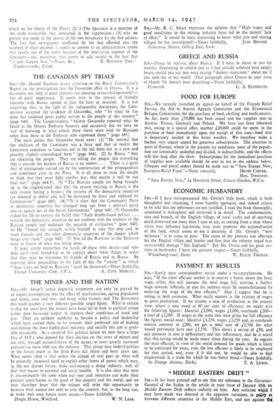THE CANADIAN SPY TRIALS
Sta,—Mr. Harold Nicolson draws attention,to the Royal Commission's Report on the investigation into the Gouzenko affair in Ottawa. It is a document not only of great interest—an amazing seven-shillingsworth!= but of great importance. It seems wise in the interest of friendly relations with Russia openly to face the facts as revealed. It is not surprising that, in the light of the indisputable documents, the Com- mission accepted the evidence of Gouzenko, who "by what he has done has rendered great public service to the people of this country" (page 648). The Commissioners "believe Gouzenko reported what he heard at the Ottawa Embassy honestly and accurately but we have no way of knowing to what extent these views were held by Russians other than those in the Embassy who expressed them" (page 665).
The main points that Gouzenko made were: (1) "He insisted that the abolition of the Comintern was a farce and that in reality the Comintern continues to function, not in the old form but in a new and possibly slightly camouflaged form" (page 664). (2) In Russia "they are educating the people. They are trillinr the people that everything that is outside the borders of Russia is an enemy. . There is a great deal of propaganda carried on by the conversation of the propagandists and sometimes even- in the Press. It is all done to train the people to think that they must fight another war, that maybe it will be our final war" (page 664-5). (3) "The Russian people are being brought up in the singlerninded idea that the system existing in Russia is the only system having a future ; the systems of the democratic countries are doomed to defeat and will be destroyed by force and replaced by Communism" (page 665). (4) "It is clear that the Communist Party in democratic countries has changed long ago from a political party into an agency net of the Soviet Government" (page 640). (5) Gouzenko staked his life to express the belief that "Such double-faced politics . . . towards the democratic countries do not conform with the interests of the Russian people and endanger the security of civilisation." (page 640). (6) He "found the strength within himself to take this step and to warn Canada and the other democratic countries of the danger which hangs over them" (page 641). (7) Not all the Russians in the Embassy were in favour of what was being done.
It must surely strengthen the hands of those who desire—and who does net?—real friendship to be explicit about these things in order that they may be overcome by friends of Russia and in Russia. By exposing these proceedings to the light of .day the "extent" to which "these views are held by Russians" must be decreased.—Yours faithfully,


































 Previous page
Previous page